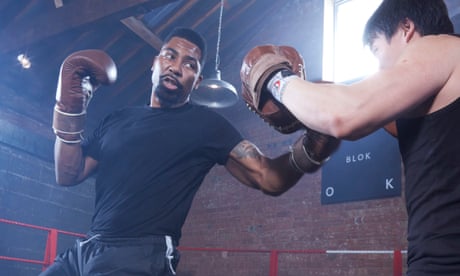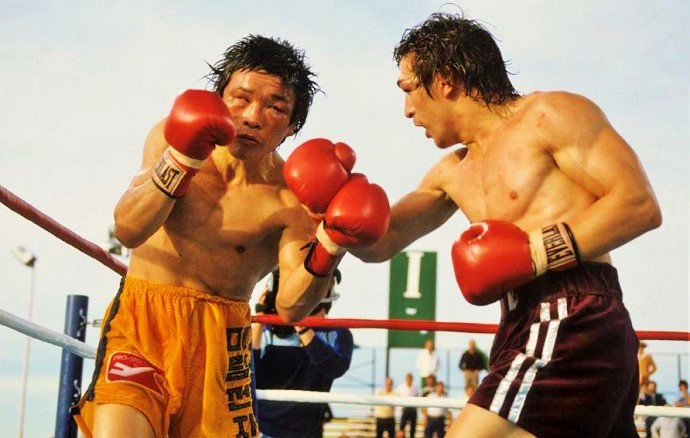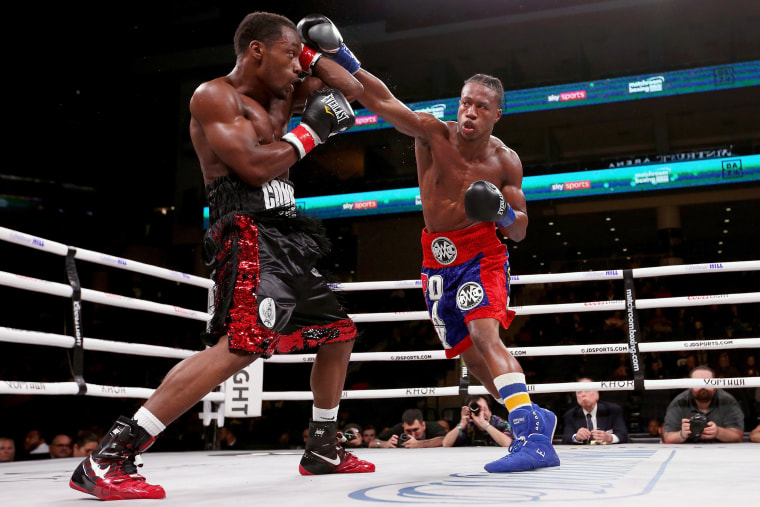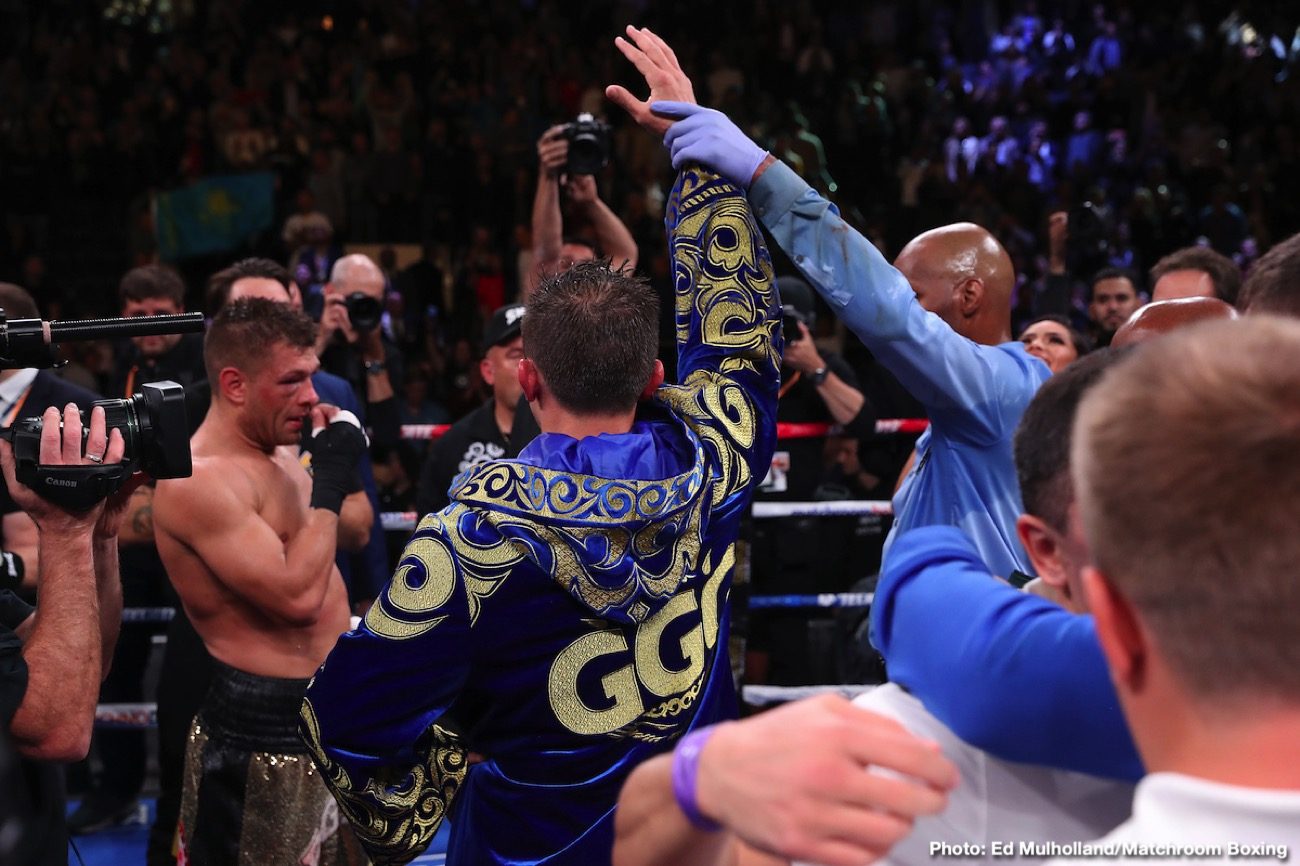FEBRUARY 17, 1983
Boom Boom Mancini: The BoxerHis story seemed like a real-life ‘Rocky.’ Then, the plot took a deadly turn one afternoon in Las Vegas
By
VIC ZIEGEL
Ray Mancini lands a punch against Deuk-Koo Kim during the bout at Caesars Palace in Las Vegas, Nevada, on November 13th, 1982.
The Ring Magazine/Getty
When the fourteenth round began, I knew I took a lot out of him. But he came rushing at me. I sidestepped him. I hit him with a left hook that shook him up, a right hand that rocked him. Threw another right hand and missed it. Left hook, missed it. Then I shot the right hand, and I caught him square on the chin. I felt that punch. When he went down, when I saw him on his back, boy, I felt great. That was such a good win. A damn good win. The kind that makes good champions into very good champions. But there’s no joy in it now, no proudness.
–Ray “Boom Boom” Mancini
THE CHALLENGER WAS CARRIED FROM THE ring unconscious, strapped to a stretcher and operated on that night for a blood clot on the right side of his brain. The surgeon said the clot was the result of a blow or an accumulation of blows that Duk Koo Kim had taken during the fight with Ray Mancini. Kim was placed on life-support systems. “There is severe brain damage,” said Dr. Lonnie Hammargren. “The pressure will go up, and up, and that will be it. He’ll die.” Four days later, a Nevada State District Court declared Kim legally dead.
The reaction was swift. “No other sport is based upon premeditated blows to the brain,” wrote New York Times sports columnist George Vecsey of the November 13th bout in Las Vegas. He urged the abolition of boxing. Howard Cosell said he would no longer broadcast professional boxing. The World Boxing Council (WBC), one of the two worldwide organizations that attempts to regulate boxing, announced that all championship bouts under its jurisdiction would be cut from fifteen to twelve rounds.
The Nevada State Athletic Commission waited until its next regularly scheduled meeting– – four weeks after the Mancini-Kim bout –– to recommend new safety measures. The rule changes were approved by a vote of three to one. After all, it had been seven years since the last fighter had died in Nevada.
“Maybe I don’t blame myself,” Mancini says, “but I can’t alienate myself. I was part of it. And it hurts a lot to know that. That’s what bothers me more than anything. The day after the fight. I looked at my hands –– they were all blown up, like balloons; they were killing me –– and I said. ‘My hands could do that?’ It was hard for me to comprehend. My faith in God may not help me to understand it, but it may help me get through it.”
He returned to Youngstown, Ohio, behind dark glasses that covered his own bruises. Now that the steel mills have closed. the unemployment rate in that area is twenty-two percent, the worst in the country. Boom Boom, the local boy who made good and always comes home, is their one successful advertisement. The highway sign that welcomes you to Youngstown includes the information that Ray Mancini is a taxpayer. A street is named for him. Plans were being made for a man-of-the-year dinner. The man was Mancini. Never mind that his year included a fatal afternoon in Las Vegas.
“As soon as I got home, little kids were calling my answering machine, crying, crying. ‘Boom, we love you, we don’t want you to give it up, we want to see you fight again.'” Mancini says. The letters he received were “ninety-eight percent favorable. ‘Boom, go ahead. It’s not your fault.’ What bothered me the most was people’s insensitivity. ‘Hey, Boom. don’t worry about it. It coulda been you. Better him than you.’ I know they didn’t mean anything wrong. But what if it was me? His people would have been telling him the same thing: ‘Better him than you.’ Like that justifies it. That still bothers me. ‘Hey, Boom, it coulda happened to you at any time.’ Hey, I know that. I don’t want to hear that crap. Don’t tell me that.”
WHAT THE HELL WERE THEY DOING IN that ring, anyway? That was the question asked when the Mancini-Kim fight was first announced. The answer, from the boxing insiders, was a wink. What you must remember is that, at the time. Mancini was America’s only white champion. Articulate. Adorable, if not handsome. A good son. A crowd-pleasing fighter inside the ring, the boy-next-door away from it. A hot property. Maybe even a movie. He loves movies.
“Did you see Rocky III?” Mancini asks. “When Burgess Meredith dies in the locker room? That choked me up. How about The Champ with Jon Voight? The old man works his way up to a title shot, he’s sick. he shouldn’t fight, but he wants to do it for the kid. And he dies right in the kid’s arms. Stuff like that appeals to me. Sure, they’re corny. No doubt about it. But corny hits a nerve. Corny sells.”
There were, before the Kim fight, at least three film companies bidding to turn a camera on the cornfield that was Ray Mancini’s twenty-one-year-old life. Get a load of the scenario:
His father is about to fight for the lightweight title when he’s drafted. The old man is wounded in action and doesn’t make it back as a fighter. His son – –let’s call him the kid – –dedicates his life to winning the title his father was denied. Nobody believes the kid is good enough. But he beats everybody. He’s in training for the fight with the champ when the doctors operate on his old man’s heart. The old man’s at ringside, in a wheelchair. watching the kid go for the title. And lose. The kid starts over. He earns another chance at the championship. This time, it’s roses. The kid’s the lightweight champ. And he embraces the old man in the ring. Corn? This is practically succotash.
“But it’s not a Rocky,” Mancini always tells people. “Rocky‘s a fantasy. My story’s true.”
So, while the boxing world was waiting for Ray Leonard to retire, it made sense to nominate Boom Boom Mancini as its next superstar. “With that great name, with that charm of his, he could easily become an advertising star,” says George Lois of Lois, Pitts and Gershon, an ad firm that often utilizes athletes. “We’ve been talking about him. And if we are, so are other guys. If he can keep from getting beat. . . .”
And that, the boxing guys told themselves, was what the fight with Kim was all about. Mancini was too valuable a piece of merchandise to be squeezed and discarded. This was supposed to be an easy payday, a chance for him to pick up $250,000 while fighting a nobody from nowhere, keep the title safe, look good on national television so that maybe the next time he stepped between the ropes, the pay would be close to a million.
“Mancini’s an ordinary fighter,” says Paddy Flood, an astute fight manager. “But that’s all you have to be as far as TV is concerned. He’s a talker, he’s got a personality, he’s a nice-looking kid, but I don’t think he can fight. If there were no TV, if he had to come up through the small clubs, forget it.”
Eddie Futch trains heavyweight champ Larry Holmes and was in the opposing corner when Mancini lost his first title opportunity (as well as his only professional fight) to Alexis Arguello, a three-time world champion. Futch believes that time is running out on Mancini. The trainer uses a teacup to make his point. “Speed is a big part of his game,” Futch says. “Right now, the punches are going here.” His hand grazes the cup. “After a while, they’ll be here.” He taps the handle. “When he starts to slow down, when his reflexes aren’t as good, that’s when the punches. . . .” Futch raps the center of the cup.
The movie company that films the Mancini story will never use that last speech. Not when they have this sort of Rocky scene from Mancini’s last amateur fight.
Flashback: Indianapolis, 1979, the lobby of a Holiday Inn. Murphy Griffith, a boxing trainer, is on the way to the National Golden Gloves at a local arena. Griffith, fifty-nine years old and a thirty-one-year navy veteran, is in Indianapolis at the behest of David Wolf, a New York writer and a former sports editor of Life magazine turned fight manager.
Wolf is hoping his trainer can find a professional prospect – –let’s call him the kid. The prospect doesn’t have to win the tournament. It would probably help if he didn’t. Wolf’s one serious brush with boxing at that point was an attempt to squeeze some life into the career of Duane Bobick, a recycled heavyweight. The manager almost certainly didn’t have the clout, or the credentials, to walk off with the tournament’s Most Valuable Puncher.
Griffith the trainer knew all that. What he didn’t know was how to reach the arena. The woman behind the registration desk suggested a bus. The driver said he would be delighted to tell Griffith when they reached the arena. As Griffith recalls, it was an hour later when he decided to ask the driver.
Griffith: “Haven’t we come to the arena yet?”
Bus Driver: “Are you still on this bus?”
Cut to the trainer finding a taxi and reaching the arena a lot later than he planned. He bought a ticket, hurried inside and watched the last thirty seconds of a lightweight quarter-final bout. One kid in the ring, Griffith noticed, was throwing punches “like there wasn’t going to be none left for tomorrow.” It didn’t matter that the kid was a loser when the decision was announced. Griffith was in love.
The trainer hustled to ringside and asked someone the kid’s name. The answer was Mancini. “There was a Mancini who fought the same style around New York before the war. Boom Boom,” Griffith said. He had the right breeding. Fade out.
Fade in: a coffee shop in a Phoenix hotel. Mort Sharnik, boxing consultant for the CBS network, stops for a chat with one of the young six-round fighters on that day’s show. Sharnik is killing time. The star for CBS this afternoon is Too Tall Jones, the defensive end for the Dallas Cowboys, who is taking a fling at boxing. All Sharnik knows about his breakfast companion is that he’s managed and trained by the same people, Wolf and Griffith, who brought him Too Tall. Over coffee, many cups, Sharnik begins listening to the Ray Mancini story: his father’s lost title fight, the war, the kid’s dream. Even a poem the fighter had written for his father.
I want to be like this courageous man.
For I love this man the best way I can;
I love you, Dad, I really want you to know.
I want to be like you, and walk in your shadow.
What did Sharnik think? “When I first heard the kid’s quest, it sounded like bullshit. But he was so ingenuous and he told his story so convincingly. And we look for stories.” Not only that, Mancini had the right answer for the network’s three questions: Can he fight? Is he charismatic? Does he have a story? “You’re always looking to get more than just the boxing fan,” Sharnik says. The boxing fan plus those other viewers is called ratings. “He has it,” Sharnik maintains. “He’s a good ratings getter. There’s passion there. And pathos.”
Fade in: two and a half years later, a boxing ring, Atlantic City. The kid, fighting Alexis Arguello for the WBC lightweight championship, is sitting on his stool after the twelfth round. He was knocked down seconds earlier and is bleeding from both nostrils and a cut on his lip. “I was hoping they’d stop the fight for the kid’s sake,” Futch remembers. “And I was saddened he was allowed to go out for the last two rounds, because you do not get into trouble with Alexis and get off the hook.”
The kid was in over his head, a familiar condition in the real world. And the G-rated script that had been Mancini’s life was about to fail him. “The fight was hardly something Griff and I approached with blissful confidence,” Wolf admits, “but I felt the worst thing that could happen was that Ray would come out of the fight with a great deal of credibility and marketability.” Mancini was stopped in the fourteenth round, a triumph of credibility. He fought twice in the next three months, scoring knockouts each time. Eight months after his marketability was enhanced by the Arguello beating, he was shooting for the other lightweight title, the half of the champion’s belt that belonged to Arturo Frias and the World Boxing Association (WBA). In a single savage round that lasted only 174 seconds, Mancini was rocked twice and his eyelid slashed. But when the referee stopped the fight, he did it by interrupting a Mancini barrage and walking the new champion away from the helpless Frias.
Mancini had promised that his first title defense would be back home. And it was at Mollenkopf Stadium, the football field of Warren G.Harding High School in Warren, Ohio, ten miles from Youngstown. He knocked out Ernesto Espana, a fading former champion, in six rounds. Mancini wanted a rematch with Arguello. CBS, which had televised six of his fights, wanted the ratings-getter in front of their cameras again. Wolf knew exactly the opponent he wanted: Duk Koo Kim. It wouldn’t be easy.
IN THE OLD DAYS, FIGHT MANAGERS scouted opponents on the telephone. If the fights were important enough, the manager didn’t reverse the charges. Wolf, thirty-nine years old, is the new breed. Mancini was still a newcomer when his manager began collecting videotapes of every lightweight fighter ranked in the top ten. Last February, when Duk Koo Kim, a little-known Korean, won the Oriental and Pacific lightweight championship, he was jumped into the WBA rankings. Naturally, Wolf had to have tapes of Kim.
The manager saw a fighter with a familiar, straight-ahead style. “I knew,” he says, “that if Ray and Kim ever fought, it would be damn entertaining. The only thing I didn’t know about Kim was his chin.” Wolf learned that Kim had never been cut, never knocked down. “So I figured he probably had a chin.”
In the WBA rankings issued last summer, Kim –– incredibly, it seemed –– was suddenly number one. He had won four times since becoming Oriental champion, and the boxers ranked ahead of him had been beaten or inactive. The WBA’s rival, the WBC, rated Kim seventh. Ring Magazine and the International Boxing Writers Association, yet two other groups who rank fighters, ignored the Korean lightweight.
Why was the WBA so impressed with Kim? “Politics,” explains a member of a rival boxing group. “The WBA president got himself elected because the Koreans and Japanese threw their support behind him. Now look at the ratings and you’ll see how many Oriental fighters are ranked.” (In the same list that put Kim on top, thirty-three Oriental fighters out of 150 fighters in fifteen weight classes were named by the WBA. The WBC recognized twenty.)
Wolf was dealing with hard facts. He managed the WBA champion, and he had to concern himself with the leading challenger. The by laws state that the champ must sign to defend against number one within six months of winning the title. If the match is not made inside that deadline, any promoter is free to make an offering for the title fight, with the highest purse offered receiving the match. What terrified Wolf was that Kim’s followers in Korea might produce the richest offer. Wolf hated the idea of the fight’s being held before a crowd in Seoul that didn’t care how much Boom Boom loved his father.
He insisted that his fighter be put together with Kim. The promoter, Bob Arum, “wanted anybody else in the top ten,” Wolf says. His reasons would have been sound. The promoter makes the majority of his money by selling the fight to a network and an arena. Mancini punching against a fighter unknown in the U.S. was hardly an attractive fight for a television network.
When Arum brought the fight to CBS. Sharnik was less than delighted. “Why not have him fight somebody we know about?” Sharnik asked. “Don’t you have an American?” He watched tapes for an hour, grumbling about the Korean’s style. “He was awkward, his technique was awful, he threw punches off the wrong foot.” That was bad enough. “I turned Kim down,” Sharnik says.
Without a network’s contribution, the fight’s potential worth would be drastically reduced. The promoters were ready to turn to ABC, hoping for approval and the right price. At about that time, Wolf met Peter Tortorici, the CBS executive who buys the programming for the weekend sports shows. “I told him to get Sharnik to look at the Kim tapes again. I told him Sharnik would be embarrassed by the war people would see on ABC,” Wolf says.
Sharnik went back to the screening room. He says he watched tapes for more than four hours. He called around the world. He was told that Kim was “a tough guy who could fight. He had a good left hand, was well conditioned.” Sharnik also realized from the tapes that he was staring at “a mirror image of Ray Mancini. A fighter who fought with the same kind of intensity. He lacked polish, but I had been thinking of him in the ring against a classic boxer, a state-of-the-art fighter. When I realized he’d be in with Mancini, another brawler. . . .”
He gave his blessing. CBS paid an estimated $440,000 for the broadcast rights, and Caesars Palace tossed in nearly $200,000. Mancini was to be paid $250,000, or forty-five percent of the fight’s gross, whichever was greater. Kim was to receive $20,000 and the Korean television rights, which would have added at least $40,000 to his estate.
AFTER THE FIGHT, RAY MANCINI WAS celebrating in his locker room. He was unaware that Kim had been lifted off the canvas, placed on his stool and, still unconscious, had slid to the floor. “The first thing I heard.” Mancini says, “was that they took him to the hospital because his jaw was broken.” When his trainer, Griffith, stepped into the room, Mancini asked him if he knew why Kim had been hospitalized. The trainer pointed to his head.
“That night, they told me he wasn’t going to make it.” Mancini says. “I was numb. I didn’t know what to feel. I was so happy, so satisfied with my win, then I turned to numbness. I was sitting there like a zombie. I didn’t know what to do. I didn’t have no idea.”
The sportswriters kept asking if he was thinking about retiring. “I said, ‘I’m not talking about retirement, and I’m not talking about a next fight either.’ I told them I didn’t know what I wanted to do.” But he did. He’s a fighter: he wanted to fight. “But I didn’t know how it would lay on me. I had to make sure I could go back in there with the same intensity, the fire I always fought with. If I was wary, gun-shy, then it was best for me to walk away.”
He waited two weeks and went to a fight in Atlantic City. During the first preliminary match, “every time somebody got hit, I was wincing, feeling the punches.” The main-event boxers were ranking lightweights, and the winner would be in line for a chance at Mancini’s title. “By the time they got in there. I was bobbing and weaving with them, and I wished I was in there too. Right then, I knew I was ready to get back.”
So, once again, it’s business as usual. Wolf is planning a nontitle fight for Mancini – –”I want to make sure there aren’t psychological problems before he defends his title again” –– and a championship bout in March. “He’s not going in for less than a million,” the manager promises. Sometime in the summer, Mancini may be matched with Howard Davis Jr., a gold-medal winner from the same Olympics class that produced Sugar Ray Leonard, former heavyweight champ Leon Spinks and Spinks’ brother, Michael, the current light heavyweight. “For that one,” Wolf says, “anyone who doesn’t call up offering at least $2 million can save his dime. If anything, I think the fight with Kim increased Ray’s marketability, both for boxing purses and ancillary income.”
There’s a toy company in Chicago that plans a line of children’s boxing equipment bearing Mancini’s name. Mancini has signed a new, more lucrative contract with Sassoon –– he wears its logo into the ring. A national hotel chain, Wolf says, is about to enter into a promotional venture with Mancini. “The fact that Ray didn’t run away, that he showed sincere sadness, generated a lot of sympathy for him, an even greater following than he had before,” the manager says.
Ray Leonard’s popularity –– a process that began when ABC televised his Olympic triumphs, and then almost every one of his early professional fights –– was in great measure responsible for his earning approximately $25 million for his last three major bouts. When the rest of the world discovered he could talk, he was offered work as a ringside commentator, and a 7-Up bottle was put in his hand. Mancini is prepared for that same feast. “Hey, if I could project that boy-next-door image, make a hundred thousand with a company by just signing my name, instead of having to go out there and get punched around, so be it. Please. I’ve got no set amount of fights or years. God willing, this time next year, if I get a few of them seven-figure fights, I will be out of it. What happened in Vegas helps me want to get out of it sooner.”
Months before the Kim fight, Wolf brought his champion to Ed Justin’s office in Manhattan. Justin is a licensing agent. Thirty years ago, he started finding commercial tie-ins for NBC television performers like Howdy Doody and Rin Tin Tin. The Monkees were another gold mine. Now the T-shirts on his wall belong to Eric Estrada, Deborah Harry, Fame. For Ray Mancini, he sent fliers to more than 7000 potential licensers. (“He would make a marvelous TV spokesperson for a fine, wholesome, nationally advertised product,” Justin figured.)
The nibbles were tentative, and Justin wasn’t surprised. “Boxing’s a tougher sell than other sports,” he says. “A major advertiser is more wary of becoming involved with boxing than, say, baseball. Show me a mother who encouraged her son to become a boxer. So far, I’m getting curiosity, but not the kind of response I’d get if he were a television property. But nobody’s told me to drop dead either.”
Mancini told Justin there were certain products he wouldn’t boom. “He doesn’t want stuff like beer,” Justin says, “and he’s right about that. I don’t want to get the usual crap –– sneakers, T-shirts, boxing gloves. He doesn’t need me for that. The National Dairy Association –– that would be perfect. His name is catchy, very good for licensing. And he looks good in a suit, doesn’t walk around like a thug. He doesn’t even act like a fighter. So sweet, I was taken aback. Did you hear him talk? This is no schmuck.”
Justin gave up on the Mancini account just before the November fight. “I was shooting for very big stuff– – the do-good-and-grow-up-to-be-a-nice-guy-like-me kind of licenses– – and I wasn’t making any headway. Fortunately, I resigned before the death. I say fortunately because I would have looked like a shit if I’d resigned afterward. It’ll take him time to get over the image he carries now. As a fighter, I guess he’ll get bigger purses because now he’s thought of as a menace. But in my area, it’s almost an insurmountable obstacle –– unless he does something like marry Princess Grace’s daughter.”
On the other hand, Lou Falcigno, the nation’s largest closed-circuit exhibitor, has changed his mind about Mancini’s future. “It’s a thin line that makes a great attraction,” Falcigno said before Mancini met Kim. “You want to watch a Mancini, but you don’t want to miss a Ray Leonard. Mancini’s a tough sell because he took that beating from Arguello.”
After Kim, Falcigno was saying, “How many times did they show those punches on television? It stays in people’s minds.” He mentioned a fight between Mancini and Aaron Pryor, who knocked out Arguello the night preceding Mancini’s fight. “That would be a hell of a closed-circuit show. The way Ray appeared on television, genuinely feeling the pain, distraught –– he came across really well. I’d have to say that fight made him something of an American hero.”
FADE IN: WASHINGTON D.C., DECEMBER 9th, a reception for Ray Mancini in the Rayburn House Office Building. There is a press conference before the party, cosponsored by Congressman Silvio Conte of Massachusetts and Lyle Williams, the representative from Youngstown. Williams’ press aide, Carl Basic, is filling in a radio reporter, who rarely covers sports, about Mancini’s fight with Kim. “The unfortunate occurence,” Basic calls it.
There are perhaps 200 people in the room when Boom Boom enters, wearing a three-piece, doublebreasted, maroon pinstripe suit. Song sheets are distributed; it’s a song about Mancini to the tune of “Rudolph the Red Nosed Reindeer.” (“Boom Boom, the lightweight champeen/Has a very Roman nose’Sometimes when it gets punched on/You might even say it glows.”) Conte contributes a poem. (“We’re glad he decided not to throw in the towel/Especially for us whose name ends in a vowel.”)
The literary portion of the program is followed by a visit from Speaker of the House Tip O’Neill, taking a few minutes away from a party celebrating his seventieth birthday. When the speaker meets the lightweight champion, the man making the introductions passes along the information that Boom Boom will soon be fighting for a million dollars.
There is more conversation about the money to be made in boxing. “A million dollars” is repeated several times. “Joe Louis made a lot of money and look what happened to him,” O’Neill says. He puts a hand on Mancini’s pinstripes. “Don’t let them do that to you, kid.”
In This Article:
Coverwall  ‘I swear a lot, and I love it.’ Photograph: Linda Nylind/The Guardian
‘I swear a lot, and I love it.’ Photograph: Linda Nylind/The Guardian






